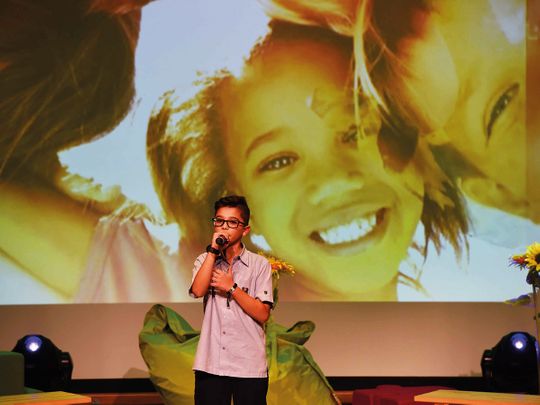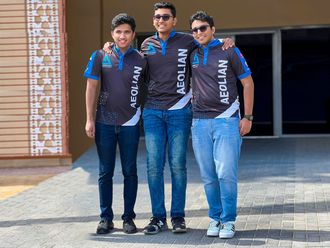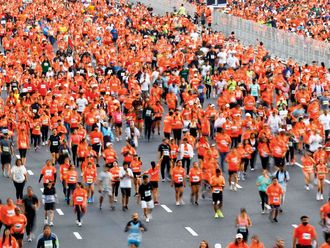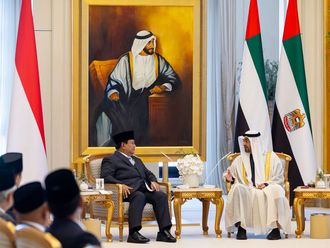
Dubai: Results of the 2018 ‘Dubai Student Well-being Census’ released on Monday suggest that 81 per cent of students are happy.
In the first census in 2017, which did not include grades 10 to 12, 84 per cent of students reported they were “happy most of the time”.
Also on Monday, the first ‘Dubai Adults@School Wellbeing Survey 2018-19’ revealed that 43 per cent of adults are “not feeling bad, but just getting by”, while 5 per cent per cent are “really struggling”.
Results of both the census and the survey were revealed by the Knowledge and Human Development Authority (KHDA) at its ‘What Works’ conference for sharing best practices in education.
Latest census
The latest student census involved feedback from 95,875 pupils from grades 6 to 12 at 181 schools. The first census in 2017 was limited to grades 6 to 9, reaching around 65,000 students in 168 schools.
Meanwhile, the adults’ survey involved 13,522 participants — 69 per cent of them teachers, seven per cent school leaders, 17 per cent in administration or other departments, and seven per cent teaching assistants — in 171 schools.
The adults’ survey also showed 24 per cent are “consistently thriving” while 28 per cent are “living well, despite struggles”. Neither schools nor KHDA can identify the results of any individual.
Both the census and the survey were held between November and December last year.
The voluntary and anonymous student census will go on for three more years in Dubai schools, with the KHDA aiming to reach 100,000 students each year to gather data on their well-being.
Each school receives its own results, which its management may choose to share with parents. The census is organised by KHDA in partnership with the Government of South Australia. The KHDA will make recommendations to schools based on their census results.
The KHDA also held the adults’ survey for the first time, in collaboration with The Wellbeing Lab.
Speaking at What Works on Monday, top officials said the overall well-being of students, and not just academic success, was a priority for the UAE.
Uhoud Khalfan Al Roumi, Minister of State for Happiness and Quality of Life, said: “Well-being in education receives special attention in our National Agenda because we know that conventional education no longer suits our interconnected, fast-changing world …. Knowledge is no longer the sole objective of education. Life skills, such as emotional and social intelligence, grit and resilience, optimism and perseverance, and many more, have become indispensable.”
She added: “Therefore, we need a holistic approach that shapes well-balanced positive citizens of tomorrow, and well-being sits at the heart of this approach.”
Al Roumi said last December the ministry launched a national ‘Well Schools’ network that “seeks to foster a culture of well-being by focusing on a set of well-being principles under four key pillars — students, teachers, the school environment and the society”.
She added that member schools receive a range of support services to help them implement activities and initiatives in line with these key pillars. The network also grants the ‘Well School’ mark to distinguished schools to highlight their outstanding effort to fostering well-being, the minister said.
More than 200 public schools — a third of all public schools in the UAE — have joined the network in the past two months. Last week, the ministry completed training for 360 teachers on the principles of well-being in education, Al Roumi added.
At What Works, she invited private schools to also join the Well Schools network.
Change needed
Also speaking at the event, Dr Abdulla Al Karam, director-general of KHDA, said education ministers meeting in Davos recently “all agreed that we have to change what we measure in education”.
Dr Al Karam said the first results of the Dubai student census in 2017 “taught us that the students’ well-being does not only depend on the well-being of the school or the teacher, but on the whole community working together”.
He added that KHDA’s measurement of well-being has been expanded to include all adults at school. “The factor that contributed the most for adult well-being was equality of relationships at school and at home. The factor that contributed the least was their physical health.”
What the student census reveals:
81% are satisfied with life
89% are more likely to be satisfied if they get a good night’s sleep; 85% say eating breakfast makes it more likely
In the ‘Perseverance’ domain,
Arab students had the highest rates; Indians in ‘Happiness’; and Westerners in ‘Least Worries’
66% of students use an electronic device before bed everyday
54% of students feel highly connected to adults at school; 75% feel the same with adults at home
What is the census?
Students in Dubai schools are being asked to answer a variety of questions on their social, emotional well-being, school relationships and engagement, physical health, lifestyle and after-school activities.
What is its scale?
The five-year annual census aims to reach 100,000 students in grades 6 to 12 each year — there are three years left to go
Are the responses private?
The census keeps student responses separate from their details, like names and grades — answers cannot be traced back to students. It is also completely voluntary and students can back out anytime
Sample questions (2017)
In this school year, how often have you been bullied by other students in the following ways [physical, verbal, cyber-bullying]?
How often do you eat breakfast?
How often do you get a good night’s sleep?
If you do not participate in after-school activities, what is stopping you?
How are adults doing at school?
5% are ‘really struggling’
43% are ‘not feeling bad, but just getting by’
28% are ‘living well, despite struggles’
24% are ‘consistently thriving’










